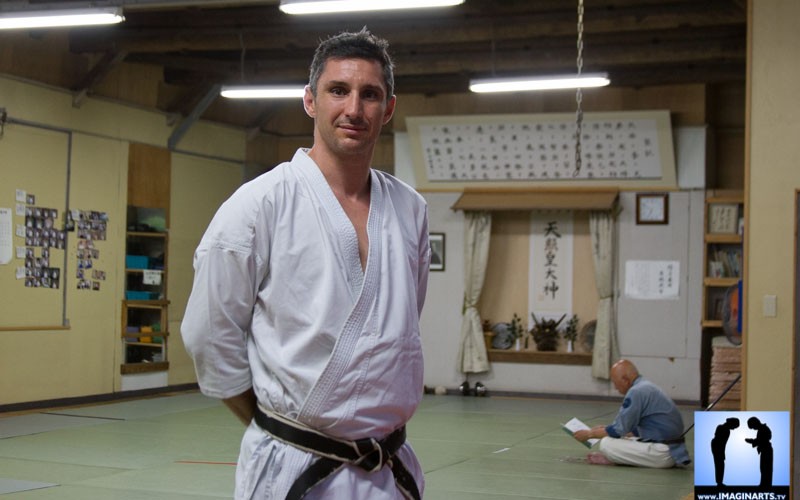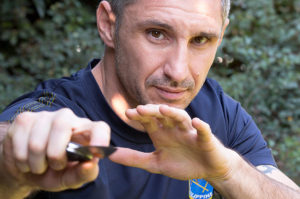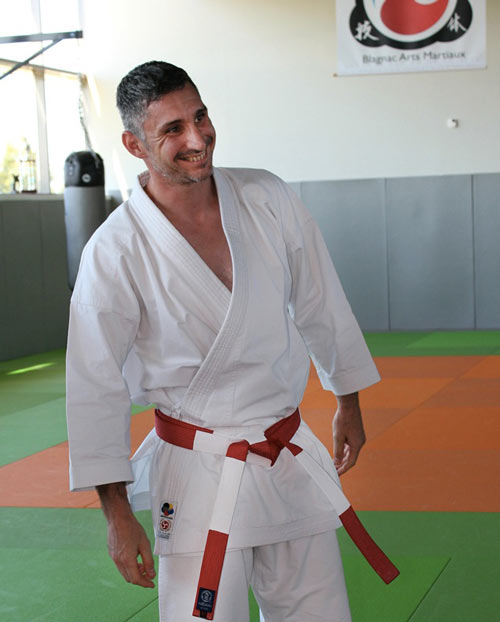Lionel Froidure is the founder of Imagin’Arts and En Terre Martiale. Born in a family of Karateka, Lionel fell into the cauldron when he was little and today he shares his passion through his classes but also his many DVDs and documentaries, as well as on the Imagin’Arts blog. 6th dan in Karate and 4th in Arnis Doblete Rapilon, Lionel is a hard-working and passionate adept whose martial skills are only matched by his kindness and open-mind.
I was lucky to meet Lionel in 2013in Paris during a seminar with Washizu sensei and to spend a good part of the evening discussing with him. This remains one of my most beautiful encounters in the martial arts world. I can only invite you to meet Lionel if you have the opportunity and failing that, to at least follow his work.
1. Do you have any morning routine?
Every morning, I get up late most of the time, but I go to bed late as well. This can explain. I wake up at 8am and every morning I take care of my son. I’m teaching in the evening, so I enjoy every morning with him, I try to give him good energy so he starts his day well. These moments with him, remind me of what matters: family. Without my family supporting me in everything I do, I do not think I could do it. He is still too small to understand that his dad is not here like other dads, but I hope he will understand it, accept it and why not, share my passion on the tatami.
After dropping him, my second routine, before work, starts. I take 10 minutes to wake up my muscles and joints. Relaxation, self-massage. Everything that can put the body on the road and at the same time it allows me to take stock of the day that begins: Urgent and important point, urgent but not important point, not urgent but important and of course not important and not urgent. This allows me to better manage my time and be more efficient. Only then do I open my computer, connect to the social media, look at my emails and start editing videos (not necessarily in this order 😃).
2. If you only had 10 min to train, what would you do?
I I had… actually sometimes I don’t even have 10 minutes and in that case I focus on visualisation and reading my notes.
3. What is the best investment you’ve made in yourself? In others?
Feeding myself without waiting to be fed. I think this is an unorthodox way to practice for most people but for many of my friends and brothers in arms, this is the only way to really invest in our practice on the very long term. Do not wait to be worthy of receiving such teaching, do not wait for an answer to the question you can not ask, do not stay behind and wait for someone to tell you, but come at the front you little guy, you’ll see better. I go ahead, I glean the information, I ask my questions to all those who are ready to answer me, no matter the martial art. The goal is to first find what we are lacking in our practice and then to find it out from those who know the answer. Once the answer is gained, learn to practice alone with the objective of implementing this new knowledge.
On others: I have formed a number of students and they happened to move to a different region. We know very well that students do not belong to us. It is therefore important, in my opinion, to give them the tools so that they can one day continue on their own path, teach them to train alone and to understand how to analyze everything that surrounds them. This may make free practitioners who can fit in anywhere and feed themselves in any class, or seminar and eventually find what they need. The worst, for an advanced practitioner, is I think, to always wait for the teacher to give you the information you need. You have to go ahead, do not wait.
4. In your opinion what are the biggest mistakes that people make when training? On the contrary, what do you think people get easily from the beginning?
They want to go ahead of themselves. We live in a world where we have to do everything in an instant otherwise we move on. This is unfortunate because we forget the need to take time to get there. Ask a blacksmith to forge a blade for you within an hour, you will see what he tells you. Time, time. I need more time to make a good quality blade. Otherwise you can go to the supermarket and buy one.
But time is not everything, it must be associated with hard work and personal introspection on our own evolution and understanding. It takes time and a lot of training to move forward. Only those who train a lot and constantly manage to improve. And the further we go, the more we get into fine motor skills, and the more time it takes. It is similar to going from forging to polishing. The first years of practice we forge, the following years we polish, we remove the unnecessary by keeping only what is essential.
An easy thing when you start is to go to the dojo. It is not that simple nowadays to go on a regular basis but with if you are willing, and you are managing your time properly, it is feasible. Apart from that, nothing is simple for a beginner, he arrives in a world of which he knows nothing: techniques, culture, label, vocabulary … He must learn everything. For this he can do something very simple: write what he has learned in a notebook and read it again before each course.
Last point and I will say that it is crucial: to leave his ego, his history, his beliefs on art in the changing room. No one can fill a cup that is already full.

5. Has any failure you had in the past help you get better at what you do? Do you have a favourite failure you could share?
I consider that a failure, whatever it is, is a way to improve. Winning, succeeding never challenges us, as indeed we succeeded. Managing failure is paramount in my approach of things. I am born unsatisfied. I do not like to watch myself perform techniques, but yet I do share them on the internet. Although I love to share my passion with other enthusiast practitioners, and the internet is a fantastic tool for that, it mainly allows me to freeze a moment and get back to it, dissect it to be able to do better next time.
A massive failure of mine was when I missed my black belt (first dan), twice. I was not ready because I did not train for kata, kihon … I only trained on the fighting aspect because I was in the French national team. When I went for Shodan, I failed. I thought it was not my fault. So I tried again without changing anything to the way I trained. And I got the same result. Even though I was a seasoned fighter, I was not technical enough. Since that day, I have never failed any grading, I was always ready because I had prepared much more than what was actually needed. I learned from my failure, I still remember the lesson and I try to pass it on to my students. As you know, certain failures must be experienced so that they can make us grow.
6. When you feel you are reaching some sort of ceiling/stagnation period in your practice, how do you go through it?
That’s quite a funny question 🙂 I’m simply training. We often think we must find the technique, the pedagogical means to go through these periods. But by thinking this way, we forget one thing: time. Every thing you create takes time, and some need even more than others. Time overcomes everything but for that we must persevere.
If I am aware of a weakness I have and I know a sensei who can help me with it, I will follow him constantly and look in his work what I am missing, in order to find the key points and principles that will allow me to get there.The hardest thing is to have the knowledge without the know-how. It’s frustrating. So we have to raise up our sleeves, go train and talk about this problem with our brothers in arms. Sometimes, stagnation is not physical but mental.

7. What do people never ask you that you wish they did?
What future for Lionel?
I have very little vision, no future planned, martially speaking. Many people plan far ahead thinking of tomorrow. If I had done that 10 years ago, I would not be where I am today. That’s the magic in life, it is always surprising us. We have to adapt and go with the flow.I prefer to think of today or tomorrow, of the projects I would like to realize in a very close future, but I don’t think of how I will be in the future. I just wish that on my death bed I can tell myself that I had a good life, that I loved, that I was loved, and that I was a passionate man, as Paulo Coelho said: a warrior of light. Simple things for a man who wants to live a life filled with simplicity. As in martial arts, all the complexity lies in simplicity.
1. Continue to take good care of your relative and those who matter to you, because without them, no path you will ever take will fulfill you
2. Listen to your elders
3. Always question the words of your elders, compare, test and keep what works for yourself (but do not drink their words like holy water)
4. Move ahead without worrying about others because we always are somebody else’s fool
5. Trust your instinct more than the judgment of others
6. Do not let anything loose, be persistent but not stubborn
7. Believe in your dreams and do whatever it takes to get there without leaving behind those who are next to you.
